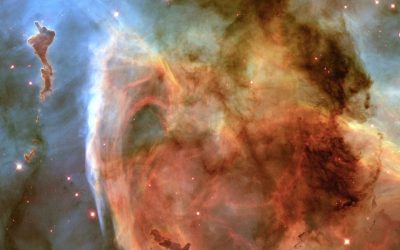Genesis 50:1–26: God Meant it for Good
The final chapter of Genesis gives a fitting conclusion to the whole book, and looks forward to the rest of the Bible’s story. God is working all things together for our good. (Exposition of Genesis 50:1–26)
Genesis 49:1–33: The Final Blessing of Jacob
As Jacob comes to the end of his life, he bless all his children—especially to establish the promise of a king. God blesses the world through the King of Israel. (Exposition of Genesis 49:1–33)
Genesis 48:1–22: Blessing for Joseph’s Sons
Jacob reflects back on the gracious favor God has shown him through his lifetime, and Jacob passes on God’s grace through blessing Joseph’s children. God extends unmerited favor to his people. (Exposition of Genesis 48:1-22)
Genesis 47:13–31: Buried in Canaan
Joseph wisely administers food to save the Egyptians, and Jacob insists that Joseph should bury him back in Canaan. God preserves the living and raises the dead. (Exposition of Genesis 47:13–31)
Genesis 46:28–47:12: Few and Evil, the Days of our Sojourning
Even though the Israelites are an abomination in Egypt, they possess something greater: God’s own promises. God makes sojourners into superiors. (Exposition of Genesis 46:28–47:12)
Genesis 45:16–46:27: A Nation Going Down to Egypt
After Joseph reveals himself to his brothers, the Joseph narratives through the end of Genesis shift to a new focus: God is creating a new humanity. (Exposition of Genesis 45:16–46:27)
Genesis 45:1–15: God Sent Me, Not You
How can Joseph forgive his brothers after all the evil they have done? Where has God been through all of this? In the midst of evil, God accomplishes good. (Exposition on Genesis 45:1–15)
Genesis 44:1–34: God Has Found Out Our Guilt
The testing of Joseph’s brothers surfaces their past sins and the iniquity of their hearts. In doing so, God leads them to repentance and salvation. God finds our sin, so that we may find Christ. (Exposition of Genesis 44:1–34)
Genesis 43:1–34: The Mercy of God Almighty
In Genesis 43, God providentially forces his people to confront fear, sin, and forgiveness, because God is setting right all that has gone wrong with the world. (Exposition of Genesis 43:1–34)
Genesis 42:1–38: What is this that God has Done?
The process of reconciling Joseph and his family must accomplish much spiritual work in the lives of God’s people. The Lord tests his people to confront their sins and to overcome their fears. (Exposition of Genesis 42:1–38)
Genesis 41:37–57: Fruitfulness through Affliction
Joseph’s eventual exaltation does not minimize his suffering, but it gives his suffering important context for understanding God’s wisdom. God gives fruitfulness through our affliction. (Exposition of Genesis 41:37–57)
Genesis 41:1–36: The Thing is Fixed by God
Joseph must wait two years for his deliverance, and God brings Pharaoh to the end of his wisdom. God alone gives true wisdom. (Exposition of Genesis 41:1–36)
Genesis 40:1–23: Do Not Interpretations Belong to God?
Joseph’s interaction with the cupbearer and the baker reflects his confident faith, despite his trials. Still today, interpretations belong to God. (Exposition of Genesis 40:1–23)
Genesis 39:1–23: The Lord was with Joseph
As Joseph’s circumstances become increasingly worse, we find the strongest affirmations that the Lord is with him every step of the way. The Lord is with his people, even in their suffering. (Exposition of Genesis 39:1–23)
Genesis 38:1–30: More Righteous than I
Even in the horrifying story of Tamar’s seduction of Judah, God is still at work. Judah begins with thorough spiritual blindness, because God opens our eyes to our unrighteousness. (Exposition of Genesis 38:1–30)
Genesis 37:12–36: Joseph the Captive
In Genesis 37:12–36, Joseph suffers tremendously at the hands of his brothers. Even so, God works all things together for our Good. (Exposition of Genesis 37:12–36)
Genesis 37:1–11: Joseph the Dreamer
The introduction to Joseph portrays him as a faithful prophet who one day will become a ruler. For this, Joseph’s brothers hate him. (Exposition of Genesis 37:1–11)
Genesis 36:1–37:1: The Settlement of Jacob
God excludes Esau to prepare for the coming of Christ into the world. Thus, God excludes the worldly from his promises in order to enroll the whole world as his people. (Exposition of Genesis 36:1–37:1)
Genesis 35:1–29: The Conquest of Jacob
God brings the storylines of Jacob’s life to a close in order to open the next phase of his redemptive plan. God decreases Jacob in order to increase Israel. (Exposition of Genesis 35:1–29)
Genesis 34:1–31: The Passivity of Jacob
Leadership requires sacrificial responsibility. God will establish his kingdom without fail, whether by his appointed leaders or by zealous substitutes. (Exposition of Genesis 34:1–31)
Genesis 33:1–20: The Reconciliation of Jacob
As the reconciliation of Jacob and Esau demonstrates, God reconciles us to our brothers in order to restore us to himself. (Exposition of Genesis 33:1–20)
Genesis 32:22–32: The Struggle of Israel
When God wrestles with us—and even when he cripples us—he does not seek our harm, but our lasting good. God wrestles with us to remake us. (Exposition of Genesis 32:22–32)
Genesis 32:1–21: The Sacrifice of Jacob
In the moment of Jacob’s greatest weakness, he comes most closely to resemble his most illustrious Descendant. God sustains our faltering faith when we are in the shadow of death. (Exposition of Genesis 32:1–21)
Genesis 31:22–55: The Dispute of Jacob
When it seems that Laban will defeat Jacob, God intervenes to stop Laban from harming Jacob. God conquers the enemies of his people at the darkest hour. (Exposition of Genesis 31:22–55)
Genesis 31:1–21: The Flight of Jacob
The flight of Jacob from Laban foreshadows God’s call to his church: God calls his church out of this world into his holiness. (Exposition of Genesis 31:1–21)
Genesis 30:25–43: The Increase of Jacob
Our oppressors falsely believe that they control us. Instead, God plunders the oppressors of his people. (Exposition of Genesis 30:25–43)
Genesis 29:31–30:24: The Offspring of Jacob
The story of Jacob’s household vividly portrays the free grace of God, for God remains faithful to his faithless people. (Exposition of Genesis 29:31–30:24)
Genesis 29:1–30: The Deception of Jacob
God is not deceived; we reap what we sow. Even so, God fulfills his promises through discipline. (Exposition of Genesis 29:1–30)
Genesis 28:1–22: The Giving of Jacob
Through Jacob’s Ladder, we learn that God generously blesses his people to make us into a generous blessing. (Exposition of Genesis 28:1–22)
Genesis 26:34–27:46: The Blessing of Jacob
Isaac, Rebekah, Esau, and Jacob all far short, but God blesses his people according to his purposes, nor ours. (Exposition of Genesis 26:34–27:46)
Genesis 26:12–33: The Blessings for Isaac
God works all things together for good, but he does not eliminate pain. Rather, God blesses his people by promoting his kingdom. (Exposition of Genesis 26:12–33)
Genesis 26:1–11: The Covenant of Isaac
Isaac must choose between God’s promises and the forbidden fruit of Egypt. In order to be saved, God requires us to abide in Christ. (Exposition of Genesis 26:1–11)
Genesis 25:19–34: The Birthright of Jacob
The earthly-mindedness of Esau loses everything, while the heavenly-mindedness of Jacob gains everything. (Exposition of Genesis 25:19–34)
Genesis 25:1–18: The Completion of Abraham
Abraham’s death teaches that in order to fulfill his promises completely, God does not fulfill his promises immediately. (Exposition of Genesis 25:1–18)
Genesis 24:1–67: The Commissioning of Abraham
Abraham seeks a bride for Isaac on the basis of faith. God provides what he promises through promises and prayers. (Exposition of Genesis 24:1–67)
Genesis 23:1–20: The Commerce of Abraham
Sarah dies before the fulfillment of God’s promises, but death is not the end. Genesis 23 anticipates the resurrection. (Exposition of Genesis 23:1–20)
Genesis 22:1–24: The Cure of Abraham
In Abraham’s test of sacrificing Isaac, we learn that God heals our innermost injuries by calling us to sacrifice our most precious possessions. (Exposition of Genesis 22:1–24)
Genesis 21:22–34: The Callings of Abraham
God accomplishes more than we realize through our ordinary, mundane callings. God sanctifies us through our vocations. (Exposition of Genesis 21:22–34)
Genesis 21:1–21: The Casting-Out of Abraham
Our Enemy tells us that God withholds good from us. On the contrary, God cares for our needs more than we do. God fulfills his promises. (Exposition of Genesis 21:1–21)
Genesis 19:30–20:18: The Correction of Abraham
While we might be tempted to think that sin only exists elsewhere, the Scriptures tell us that God disciplines those whom he loves. (Exposition of Genesis 19:30–20:18)
Genesis 19:1–29: The Covenant Remembrance of Abraham
The only hope for unrighteous people is in the prayers of the righteous, for God remembers the prayers of the righteous when he judges the wicked. (Exposition of Genesis 19:1–29)
Genesis 18:16–33: The Confidence of Abraham
Can we really trust God? In fact, God invites us to bring our concerns to him. God reveals his righteous character by word and prayer. (Exposition of Genesis 18:16–33)
Genesis 17:15–18:15: The Company of Abraham
Abraham and Sarah struggle to believe God’s promises to give them a child. So, God eats and drinks with us to overcome the limitations of our faith. (Exposition of Genesis 17:15–18:15)
Genesis 17:1–14: The Circumcision of Abraham
In Genesis 17, we discover the significant of covenant signs: God gives covenant signs to ratify our claim to his covenant promises. (Exposition of Genesis 17:1–14)
Genesis 16:1–16: The Concubine of Abram
When our faith is stretched, we start to believe that God has forsaken us. But even when God seems silent, God sees, and God hears. (Exposition of Genesis 16:1–16)
Genesis 15:1–21: The Covenant of Abram
What do we do when the honeymoon is over in our relationship with God? God’s covenant assures us in suffering that God will keep his promises. (Exposition of Genesis 15:1–21)
Genesis 14:17–24: The Coffers of Abram
Abram’s interaction with Melchizedek illustrates that faith may lead us to empty our hands, but faithlessness will leave us empty-handed. (Exposition of Genesis 14:17–24)
Genesis 14:1–16: The Custodianship of Abram
Worldly consumers believe that the world exists for their benefit. God’s custodians believe that the world exists for the benefit of Christ and his kingdom. (Exposition of Genesis 14:1–16)
Genesis 13:1–18: The Conciliation of Abram
Even in the fallout of failure and doubt, God gives us by faith what we forfeit by sight. (Exposition of Genesis 13:1–18)
Genesis 12:10–20: The Captivity of Abram
Abram’s sojourn in Egypt illustrates an enduring pattern: God’s covenant corrects our conspiracies. (Exposition of Genesis 12:10–20)
Genesis 12:4–9: The Conquest of Abram
Abram’s example of public witness and worship to the living God teaches us how to bear witness to the already/not-yet kingdom of Jesus Christ. (Exposition of Genesis 12:4–9)
Genesis 11:27–12:3: The Call of Abram
To redeem the world from the fullness of its depravity, God chooses a paradoxical approach: raising up one man through whom he will bless the world. (Exposition of Genesis 11:27–12:3)
Genesis 11: The End of the Beginning
The world’s solution to the problem of sin is to build a taller tower to reach up to God. The gospel insists that God must reach down to us.(Exposition of Genesis 11)
Genesis 9:18–10:32: Dispersal of the Nations
Even after a fresh start, Noah fails to become the new Adam who can save humanity. Instead, humanity must await the offspring of Noah’s son Shem. (Exposition of Genesis 9:18–10:32)
Genesis 8:20–9:17: Covenant of Preservation
God makes a covenant of preservation with Noah to carry creation forward. A covenant of redemption, however, will come elsewhere. (Exposition of Genesis 8:20–9:17)
Genesis 8:1–19: New Creation
The Flood was a de-creation, and disembarking from the ark is a new creation that foreshadows the ultimate new creation. (Exposition of Genesis 8:1–19)
Genesis 6:9–7:24: Judgment and Salvation
Is God a God of judgment and wrath, or is he a God of salvation and grace? Can we reduce God to one side or the other? (Exposition of Genesis 6:9–7:24)
Genesis 6:1–8: Apostasy
What does it mean for the sons of God to marry the daughters of men? Why does that sin spiral into God’s sending the flood? (Exposition of Genesis 6:1–8)
Genesis 4:17–5:32: The Offspring of the Woman
After Cain murders Abel, what hope is there for humanity in the world? Will all humankind go the way of Cain, or will God preserve a faithful remnant? (Exposition of Genesis 4:17–5:32)
Genesis 4:1–16: The Offspring of the Serpent
The first two children born to Adam and Eve represent two fundamentally different categories: the offspring of the woman and the offspring of the serpent. (Exposition of Genesis 4:1–16)
Genesis 3:8–24: The Curse
When Yahweh God confronts the rebellion of Adam and Eve, he curses his creation while still extending them mercy. (Exposition of Genesis 3:8–24)
Genesis 3:1–7: The Fall
Satan’s strategy for luring us into sin is fairly consistent. He tempts us to doubt whether God’s word is good, true, and relevant. (Exposition of Genesis 3:1–7)
Genesis 2:4–25: Humanity
Genesis 2:4–25 is the most important reflection on human nature, human work, and human marriage. (Exposition of Genesis 2:4–25)
Genesis 1:1–2:3: Creation
Beyond telling us what happened at the beginning of time, Genesis 1:1–2:3 tells us why it happened and what God’s work in creation means for our lives today. (Exposition of Genesis 1:1–2:3)
































































